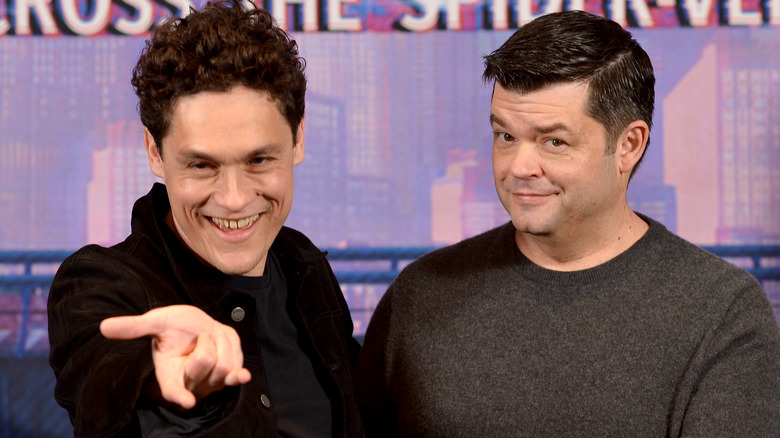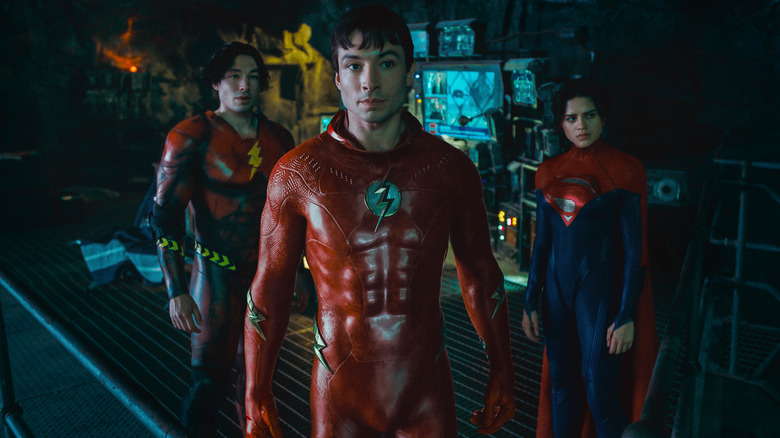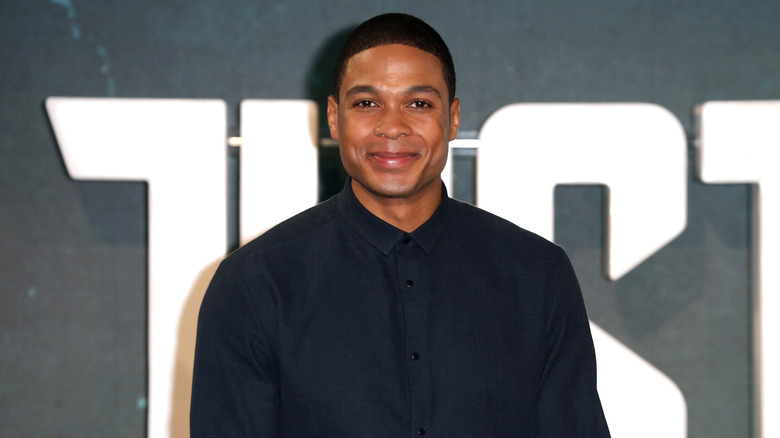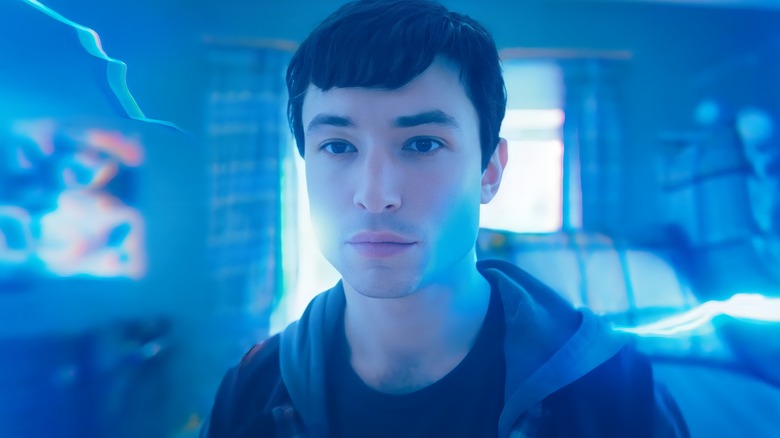The Flash: How Different Was Spider-Verse Creators Lord & Miller's Original Vision?
For better or worse, Warner Bros. and DC Comics' long-awaited superhero film "The Flash" has finally skidded into cinemas, drawing intensely polarizing reviews from critics and fans alike on its way to becoming a historic box-office bomb. Its clumsy rollout is by most metrics a disastrous end to a premiere over a decade in the making — which is pretty much an average Thursday for Warner's DC division at this point.
It may be hard to believe that hopes were high for "The Flash" once upon a time. After toiling in development hell since the late 1980s, the soft establishment of the DC Extended Universe with 2013's "Man of Steel" paved the way for a more earnest attempt to adapt the beloved speedster. By 2014, a "Flash" film was formally on the WB release schedule for October 2018.
With the studio's first choice James Wan opting to direct "Aquaman" (which was ultimately released in 2018), Warner Bros. tapped in-demand directing duo Phil Lord and Chris Miller fresh off of their impressive back-to-back 2014 box office run (between "The Lego Movie" and "22 Jumpstreet," they grossed nearly $800 million that year alone). Once they completed their story treatment, however, the duo departed in order to helm "Solo: A Star Wars Story" — a film with its own ghastly development issues that saw Lord and Miller replaced with Ron Howard halfway through principal photography.
While their most recent success "Spider-Man: Across the Spider-Verse" enjoys critical and commercial success in theatrical competition with "The Flash," Lord and Miller have provided more details about what their version of the film would've looked like — and how different the final product wound up being.
Lord and Miller weren't planning to explore the Multiverse
Before they embarked on creating their own wildly popular multiversal epic, Phil Lord and Chris Miller had no aspirations of turning "The Flash" into a universe-hopping story. According to The Hollywood Reporter, their treatment leaned entirely into the time travel plot likely inspired by the popular "Flashpoint" comic book story from Geoff Johns and Andy Kubert, with no mentions of alternate universes whatsoever. ""It did involve time travel, but it was not a multiversal story," Miller stated.
Ironically, their own animated feature "Into The Spider-Verse" arguably introduced casual moviegoers to multiversal concepts, and helped play a part in jumpstarting Hollywood's seemingly unending obsession with multiversal brand synergy. Since its debut, Marvel and DC have both slowly begun to blur the lines between the various iterations of their beloved characters, leading to such milestones as Ezra Miller's appearance alongside Grant Gustin's Flash in the long-running CW series and Evan Peters' stint in "WandaVision."
As audiences became more acquainted with concepts such as variants and alternate universes, it isn't hard to imagine that studios felt more comfortable taking risks with bringing back characters — at least, at first. In the wake of "Spider-Man: No Way Home's" overwhelmingly positive fan reception, multiversal cameos are essentially just another form of fan service. This evolution can be seen in the cameo-filled finale of "The Flash," which brings back a number of DC characters from the past several decades. Though we may never know all the exact details of how George Reeves, Nicolas Cage, and others appeared through CGI portrayals, it's possible to see it as a direct progression of what "Spider-Verse" started five years ago.
Iris West could have played a much bigger role
Though Phil Lord and Chris Miller left to focus on "Solo," they didn't entirely abandon the project. In addition to serving as producers, their treatment still resided with Warner Bros. to continue development on "The Flash." The studio would soon hire "Abraham Lincoln: Vampire Hunter" scribe Seth Grahame-Smith to direct and write a full-length screenplay based on the original treatment. He ultimately departed due to creative differences (though he later collaborated with Lord and Miller on "The Lego Batman Movie").
Next up to the plate was Rick Famuyiwa, a then-up-and-coming writer-director who had recently helmed the indie darling "Dope." Working from Lord and Miller's treatment and Seth Grahame-Smith's screenplay, Famuyiwa was as set to meet "The Flash's" fast approaching 2018 release date. He brought in "Dope" actor Kiersey Clemons to portray Ezra Miller's love interest Iris West in what could have been a superhero love story. Unfortunately, after being cut entirely from Joss Whedon's "Justice League" and spending nearly a decade dealing with changing directors, writers, producers, and studio execs, it seems Clemons' role was drastically diminished as time went on.
Though the actor seemingly harbors little ill will for those that worked on "The Flash," she admitted recently in an interview with Nylon that being attached to the film was often a stressful, heartbreaking experience that made her cry far more than it made her smile. After addressing the countless difficulties surrounding the film's chaotic production, the actor admitted, "I think I only smiled over ['The Flash'] at the premiere."
Ray Fisher's Cyborg was rumored to appear
Speaking of actors who had horrible experiences working with Warner Bros. and DC, "Justice League" actor Ray Fisher was once rumored to be brought in by Rick Famuyiwa, potentially based on notes from the treatment. This was later confirmed after both Warner Bros. and the actor himself stated that he would not be involved, with Fisher seemingly alleging that he had been let go in retaliation for his accusations against several studio personnel, including Geoff Johns, Walter Hamada, and "Justice League" replacement director Joss Whedon (per Variety). Warner Bros. denied this, stating to Variety that production had simply moved on after Fisher announced he would no longer accept offers to work with Hamada specifically.
Ray Fisher has been distant and vocally critical of the post-Zack Snyder DC era, making allegations of emotional abuse and racism against Warners creatives during his time working on Joss Whedon's "Justice League" reshoots. His statements caused the studio to launch an investigation, which found no evidence of wrongdoing from Warner Bros. or those named by Fisher. Fisher still adamantly insists his side of the story has been dismissed in favor of studio politics.
The Flash was a stand-alone film
Andy Muschietti's 2023 version of "The Flash" audaciously attempted to simultaneously erase and preserve the divisive Snyderverse, recasting central characters like Batman while going above and beyond to insist that Jason Momoa's Aquaman remains untouched by the multiversal shenanigans. These story choices were likely the result of studio heads attempting to jumpstart the next era of DC Films under the supervision of James Gunn and Peter Safran without undermining the numerous films yet to come.
When it was originally conceived by Phil Lord and Chris Miller, however, the story wasn't devised to be an event film with far-reaching implications for the future of the DC Extended Universe. Though "Man of Steel" received middling reviews, there arguably wasn't enough audience interest in rebooting the entire timeline, as fans were still hopeful that "Batman v Superman: Dawn of Justice" and 2016's "Suicide Squad" would take the budding franchise where it needed to go in terms of quality. Unfortunately, quite the opposite occurred, and rumblings (or, in some cases, prayers) that "The Flash" would use "Flashpoint" to undo the past several years grew.
It differs from fan to fan whether or not Muschietti managed to complete the, frankly, impossible task of managing audience expectations and studio demands. For their part, Lord and Miller have not yet seen "The Flash" (likely due to their busy "Spider-Verse" schedule). Though certain elements from trailers seem familiar, they maintain that the final product appears to be completely different overall.




